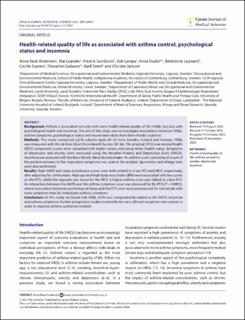| dc.contributor.author | Rask-Andersen, Anna | |
| dc.contributor.author | Leander, Mai | |
| dc.contributor.author | Sundbom, Fredrik | |
| dc.contributor.author | Lampa, Erik | |
| dc.contributor.author | Oudin, Anna | |
| dc.contributor.author | Leynaert, Bénédicte | |
| dc.contributor.author | Svanes, Cecilie | |
| dc.contributor.author | Gislason, Thorarinn | |
| dc.contributor.author | Torén, Kjell | |
| dc.contributor.author | Janson, Christer | |
| dc.date.accessioned | 2023-02-07T13:08:23Z | |
| dc.date.available | 2023-02-07T13:08:23Z | |
| dc.date.created | 2023-01-13T14:33:12Z | |
| dc.date.issued | 2022 | |
| dc.identifier.issn | 0300-9734 | |
| dc.identifier.uri | https://hdl.handle.net/11250/3048918 | |
| dc.description.abstract | Background: Asthma is associated not only with lower health-related quality of life (HRQL) but also with psychological health and insomnia. The aim of this study was to investigate associations between HRQL, asthma symptoms, psychological status and insomnia in adults from three Nordic countries.
Methods: This study comprised 2,270 subjects aged 29–55 from Sweden, Iceland and Norway. HRQL was measured with the 36-Item Short Form Health Survey (SF-36). The physical (PCS) and mental health (MCS) component scores were calculated with higher values, indicating better health status. Symptoms of depression and anxiety were measured using the Hospital Anxiety and Depression Scale (HADS). Insomnia was assessed with the Basic Nordic Sleep Questionnaire. An asthma score consisting of a sum of the positive answers to five respiratory symptoms was used in the analysis. Spirometry and allergy tests were also performed.
Results: High HADS and sleep disturbance scores were both related to a low PCS and MCS, respectively, after adjusting for confounders. High age and high body mass index (BMI) were associated with low scores on the PCS, whilst the opposite was found for the MCS. A higher asthma score was related to a low PCS. An interaction between the HADS and the asthma symptom score was observed for the PCS (P = 0.0002), where associations between psychological status and the PCS were more pronounced for individuals with more symptoms than for individuals without symptoms.
Conclusions: In this study, we found that HRQL of life was independently related to the HADS, insomnia and asthma symptoms. Further prospective studies to identify the most efficient target for intervention in order to improve asthma control are needed. | en_US |
| dc.language.iso | eng | en_US |
| dc.publisher | Upsala Medical Society | en_US |
| dc.rights | Navngivelse 4.0 Internasjonal | * |
| dc.rights.uri | http://creativecommons.org/licenses/by/4.0/deed.no | * |
| dc.title | Health-related quality of life as associated with asthma control, psychological status and insomnia | en_US |
| dc.type | Journal article | en_US |
| dc.type | Peer reviewed | en_US |
| dc.description.version | publishedVersion | en_US |
| dc.rights.holder | Copyright 2022 The Author(s) | en_US |
| dc.source.articlenumber | e8967 | en_US |
| cristin.ispublished | true | |
| cristin.fulltext | original | |
| cristin.qualitycode | 1 | |
| dc.identifier.doi | 10.48101/ujms.v127.8967 | |
| dc.identifier.cristin | 2106687 | |
| dc.source.journal | Uppsala Journal of Medical Sciences | en_US |
| dc.identifier.citation | Uppsala Journal of Medical Sciences. 2022, 127, e8967. | en_US |
| dc.source.volume | 127 | en_US |

